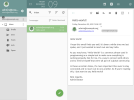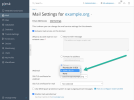- Server operating system version
- Ubuntu 22.04
- Plesk version and microupdate number
- Plesk Obsidian 18.0.48
Hi!
We have prepared and released a new extension for Plesk, it is "SOGo Webmail". It can be installed on Plesk Obsidian 18.0.48+. Currently, in Plesk Ext.Catalog, it located in the "Beta" category.
Since, it is "Beta" release and we would like to ask you provide feedback and questions about the extension in that forum thread.

We have prepared and released a new extension for Plesk, it is "SOGo Webmail". It can be installed on Plesk Obsidian 18.0.48+. Currently, in Plesk Ext.Catalog, it located in the "Beta" category.
Since, it is "Beta" release and we would like to ask you provide feedback and questions about the extension in that forum thread.

Important: This extension is currently in the Beta stage, so it is provided on an "as is" basis for evaluation and testing purposes only. The extension may lack stability, functionality or polish and is expected to have bugs. Using it for production purposes is not recommended and Plesk disclaims any form of guaranty or liability in relation to its use or engineering. Official support for this extension is not available.
What is SOGo?
SOGo is a groupware server that provides a rich AJAX-based Web interface and offers your users a uniform and complete interface to access their information.Known limitations
- Authentication
- Users with passwords longer than 15 characters will not be able to authenticate due to a bug in SOGo authentication mechanism.
- Only "sym" passwords can be used for authentication (symmetric hash, default configuration), "crypt" hashes will result in authentication failure.
- Packaging
- Nightly packages' compatibility is not guaranteed.
- Stable packages are only available on Debian 11, Ubuntu 18.04, Ubuntu 20.04, and Ubuntu 22.04, including Ubuntu 22.04 on ARM.
- Nightly packages are only available on AlmaLinux 8, Rocky Linux 8, RHEL 8, Debian 10, Debian 11, Ubuntu 18.04, and Ubuntu 20.04.
- Security
- At the moment, SSL It!/Let's Encrypt cannot be used to secure SOGo webmail with an SSL/TLS certificate.
- Miscellaneous
- At the moment, the extension is only available in English.
- Dovecot IMAP server is required, compatibility with Courier IMAP was not tested.
- Backup/migration is not implemented at the moment.
- SOGo database must be stored on the same host as the Plesk database.
Last edited:



